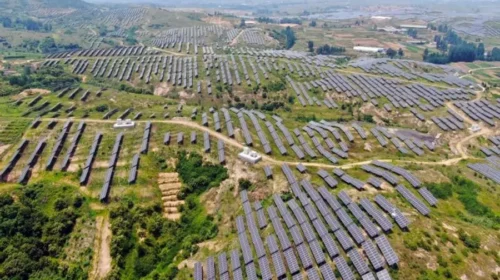From green energy to property woes, China turns to financial engineering

“This looks like a bit of a shell game… the business is going to magically disappear from the listed company’s financial statements.”

By Doug Young & Rene Vanguestaine
Two recent corporate maneuvers, though modest in scale, offer a revealing glimpse into some of the many strategic pivots happening in China. One involves a solar company, Xinte Energy (1799.HK; ), tapping into sophisticated financial instruments to fund its green energy ambitions. The other is seeing state-owned travel giant China Travel International (0308.HK) shed its troubled real estate assets to refocus on its core business. Both moves, though in very different sectors, highlight a growing pragmatism in how Chinese companies are navigating capital constraints and past strategic missteps.
We believe the case of Xinte is an interesting story of strategic adaptation. Once a producer of solar materials, the company faced a market requiring enormous investment to compete with industry giants. It wisely shifted into building and operating solar and wind farms, a move that aligned perfectly with Beijing’s ambitious goals for green energy generation. This transition, however, requires constant capital for new construction.
For a company without unlimited funding, this presents a challenge. Xinte’s solution is to securitize its assets. The company recently announced a plan to issue around 3 billion yuan ($421 million) in asset-backed securities (ABS) backed by its green energy projects, which will trade on the Shanghai Stock Exchange. This is a mechanism to unlock capital, allowing the company to recoup its investment and reinvest in new farm construction.
The decision to list these securities in Shanghai, rather than the more international market of Hong Kong where Xinte is listed, is significant. We see this as part of the Chinese government’s broader desire to build a larger, more diversified domestic capital market. For years, Beijing has understood the need to provide investors with more options beyond equities, government bonds, and a once-booming real estate market. This move helps achieve that by introducing new products while channeling capital toward national priorities like the green transition.
This being China, we are convinced we will see other companies jump on this bandwagon, likely quite quickly. Using ABS to inject liquidity makes sense for many parts of the Chinese economy. It will be particularly interesting to watch how the nation’s massive state-owned banks react. Culturally, bigger has always been better in Chinese banking, with a focus on having the largest balance sheet. This stands in contrast to the evolution of Western banking, where firms realized decades ago that an “asset-light” model of originating, syndicating, and selling off loans could be more profitable. Whether Chinese banks will embrace this fee-generating model over asset accumulation remains to be seen.
Unwinding the past: a return to core business
Our second case looks at China Travel International, which has announced it will spin off its real estate business from its Hong Kong-listed entity. This move will leave the public company with its core travel operations, including the development and management of tourism sites. The real estate division, once a major profit driver during China’s property boom, has lately become an albatross around the company’s neck as the market has soured.
On the surface, this might look like a shell game, as the real estate assets will simply be moved to China Travel International’s unlisted state-owned parent. Yet, we believe it is a practical and realistic solution. Dumping the assets on the open market would be difficult and could run counter to government efforts to stabilize the property sector. This internal transfer allows the listed company to cleanse its balance sheet and return its full focus to its core capabilities in the tourism sector.
This maneuver highlights a key distinction in the Chinese corporate landscape. China Travel International can perform this asset shuffle because it is a state-owned enterprise. Many private companies, which also enthusiastically diversified into real estate during the boom years, do not have this luxury. There was a time when it seemed every company, regardless of its core expertise, was a part-time property investor. Before that, it was a rush into mining. Such gold rushes are a recurring theme.
These private firms now find themselves in a difficult position. There are cases where companies are stuck with non-performing real estate assets they cannot easily get rid of. Admitting a mistake is difficult, especially in a business culture where the chairman is often seen as infallible and may have been in place for decades. For anyone in management to acknowledge a past decision was wrong and deal with the consequences takes time, and sometimes it never happens.
Furthermore, some are likely still holding out hope that government intervention will eventually stabilize the property market, allowing them to avoid booking major losses. For investors, this creates a landscape fraught with hidden risks. The key takeaway is clear: one must look at each company very specifically. Now more than ever, it is crucial to check the balance sheet.
About China Inc
China Inc by Bamboo Works discusses the latest developments on Chinese companies listed in Hong Kong and the United States to drive informed decision-making for investors and others interested in this dynamic group of companies.
Subscribe to China Inc on your favorite app:








